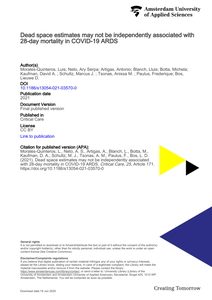BACKGROUND: Estimates for dead space ventilation have been shown to be independently associated with an increased risk of mortality in the acute respiratory distress syndrome and small case series of COVID-19-related ARDS.METHODS: Secondary analysis from the PRoVENT-COVID study. The PRoVENT-COVID is a national, multicenter, retrospective observational study done at 22 intensive care units in the Netherlands. Consecutive patients aged at least 18 years were eligible for participation if they had received invasive ventilation for COVID-19 at a participating ICU during the first month of the national outbreak in the Netherlands. The aim was to quantify the dynamics and determine the prognostic value of surrogate markers of wasted ventilation in patients with COVID-19-related ARDS.RESULTS: A total of 927 consecutive patients admitted with COVID-19-related ARDS were included in this study. Estimations of wasted ventilation such as the estimated dead space fraction (by Harris-Benedict and direct method) and ventilatory ratio were significantly higher in non-survivors than survivors at baseline and during the following days of mechanical ventilation (p < 0.001). The end-tidal-to-arterial PCO2 ratio was lower in non-survivors than in survivors (p < 0.001). As ARDS severity increased, mortality increased with successive tertiles of dead space fraction by Harris-Benedict and by direct estimation, and with an increase in the VR. The same trend was observed with decreased levels in the tertiles for the end-tidal-to-arterial PCO2 ratio. After adjustment for a base risk model that included chronic comorbidities and ventilation- and oxygenation-parameters, none of the dead space estimates measured at the start of ventilation or the following days were significantly associated with 28-day mortality.CONCLUSIONS: There is significant impairment of ventilation in the early course of COVID-19-related ARDS but quantification of this impairment does not add prognostic information when added to a baseline risk model.TRIAL REGISTRATION: ISRCTN04346342. Registered 15 April 2020. Retrospectively registered.
MULTIFILE

Background: Estimates for dead space ventilation have been shown to be independently associated with an increased risk of mortality in the acute respiratory distress syndrome and small case series of COVID-19-related ARDS. Methods: Secondary analysis from the PRoVENT-COVID study. The PRoVENT-COVID is a national, multicenter, retrospective observational study done at 22 intensive care units in the Netherlands. Consecutive patients aged at least 18 years were eligible for participation if they had received invasive ventilation for COVID-19 at a participating ICU during the first month of the national outbreak in the Netherlands. The aim was to quantify the dynamics and determine the prognostic value of surrogate markers of wasted ventilation in patients with COVID-19-related ARDS. Results: A total of 927 consecutive patients admitted with COVID-19-related ARDS were included in this study. Estimations of wasted ventilation such as the estimated dead space fraction (by Harris–Benedict and direct method) and ventilatory ratio were significantly higher in non-survivors than survivors at baseline and during the following days of mechanical ventilation (p < 0.001). The end-tidal-to-arterial PCO2 ratio was lower in non-survivors than in survivors (p < 0.001). As ARDS severity increased, mortality increased with successive tertiles of dead space fraction by Harris–Benedict and by direct estimation, and with an increase in the VR. The same trend was observed with decreased levels in the tertiles for the end-tidal-to-arterial PCO2 ratio. After adjustment for a base risk model that included chronic comorbidities and ventilation- and oxygenation-parameters, none of the dead space estimates measured at the start of ventilation or the following days were significantly associated with 28-day mortality. Conclusions: There is significant impairment of ventilation in the early course of COVID-19-related ARDS but quantification of this impairment does not add prognostic information when added to a baseline risk model. Trial registration: ISRCTN04346342. Registered 15 April 2020. Retrospectively registered.
DOCUMENT
IntroductionThe driving pressure (ΔP) has an independent association with outcome in patients with acute respiratory distress syndrome (ARDS). INTELLiVENT-Adaptive Support Ventilation (ASV) is a closed-loop mode of ventilation that targets the lowest work and force of breathing.AimTo compare transpulmonary and respiratory system ΔP between closed-loop ventilation and conventional pressure controlled ventilation in patients with moderate-to-severe ARDS.MethodsSingle-center randomized cross-over clinical trial in patients in the early phase of ARDS. Patients were randomly assigned to start with a 4-h period of closed-loop ventilation or conventional ventilation, after which the alternate ventilation mode was selected. The primary outcome was the transpulmonary ΔP; secondary outcomes included respiratory system ΔP, and other key parameters of ventilation.ResultsThirteen patients were included, and all had fully analyzable data sets. Compared to conventional ventilation, with closed-loop ventilation the median transpulmonary ΔP with was lower (7.0 [5.0–10.0] vs. 10.0 [8.0–11.0] cmH2O, mean difference − 2.5 [95% CI − 2.6 to − 2.1] cmH2O; P = 0.0001). Inspiratory transpulmonary pressure and the respiratory rate were also lower. Tidal volume, however, was higher with closed-loop ventilation, but stayed below generally accepted safety cutoffs in the majority of patients.ConclusionsIn this small physiological study, when compared to conventional pressure controlled ventilation INTELLiVENT-ASV reduced the transpulmonary ΔP in patients in the early phase of moderate-to-severe ARDS. This closed-loop ventilation mode also led to a lower inspiratory transpulmonary pressure and a lower respiratory rate, thereby reducing the intensity of ventilation.Trial registration Clinicaltrials.gov, NCT03211494, July 7, 2017. https://clinicaltrials.gov/ct2/show/NCT03211494?term=airdrop&draw=2&rank=1.
MULTIFILE
